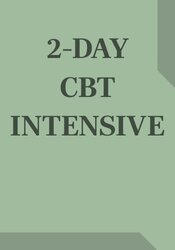
×

This workshop provides a comprehensive overview of core CBT strategies for anxiety-related disorders (e.g., panic disorder, generalized anxiety disorder, social anxiety, OCD, PTSD, health anxiety, phobias), depression, anger management, perfectionism, insomnia, and other problems, in both adults and children. Participants will learn about a variety of effective strategies, including cognitive approaches (e.g., cognitive reappraisal, Socratic questioning, behavioral experiments, imagery-based approaches), exposure-based techniques, behavioral activation, habit reversal, relaxation-based treatments, problem solving, mindfulness and acceptance-based strategies, and relapse prevention. Case formulation will be discussed and effective tools for dealing with treatment resistance (such as motivational interviewing) will also be reviewed.
All members of the PESI, Inc. planning committee have provided disclosures of financial relationships with ineligible organizations and any relevant non-financial relationships prior to planning content for this activity. None of the committee members had relevant financial relationships with ineligible companies or other potentially biasing relationships to disclose to learners. For speaker disclosures, please see the faculty biography.
NOTE: Tuition includes one free CE Certificate (participant will be able to print the certificate of completion after passing the online post-test (80% passing score) and completing the evaluation). Instructional methods will include PowerPoint, didactic lecture, and others.
Continuing Education Information: Listed below are the continuing education credit(s) currently available for this non-interactive self-study package. Program content is reviewed periodically per accrediting board rules for currency and appropriateness for credit. Credit approvals are subject to change. Please note, your licensing board dictates whether self-study is an acceptable form of continuing education, as well as which credit types are acceptable for continuing education hours. Please refer to your licensing board's rules and regulations. If your profession is not listed, please contact your licensing board to determine your continuing education requirements and check for reciprocal approval.
For other credit inquiries not specified below, please contact info@pesi.com or 800-844-8260 before purchase.
Materials that are included in this course may include interventions and modalities that are beyond the authorized practice of your profession. As a licensed professional, you are responsible for reviewing the scope of practice, including activities that are defined in law as beyond the boundaries of practice in accordance with and in compliance with your profession's standards.
For Planning Committee disclosures, please see the statement above. For speaker disclosures, please see the faculty biography.
Earn up to 12.0 CE hours. Please see below, for more details, as credit amounts vary by jurisdiction and profession.
PESI, Inc. is approved by the Canadian Counselling and Psychotherapy Association to offer continuing education for counsellors and psychotherapists. PESI, Inc. maintains responsibility for the program. This self-study activity is approved for 12.0 credit hours.
PESI, Inc. is approved by the Canadian Psychological Association to offer continuing education for psychologists. PESI, Inc. maintains responsibility for the program. This program is approved for 12.0 self-study continuing education hours. Full credit statement at: www.pesi.com/cpa-statement
This self-study activity qualifies for 12.0 continuing education clock hours as required by many national, state and local licensing boards and professional organizations. Save your activity advertisement and certificate of completion, and contact your own board or organization for specific requirements.
| File type | File name | Number of pages | |
|---|---|---|---|
| Manual - CBT Intensive (1.2 MB) | 173 Pages | Available after Purchase |

Martin M. Antony, PhD, ABPP, is a clinical psychologist, professor in the department of psychology at Toronto Metropolitan University. He received his PhD in psychology from the University at Albany, State University of New York. Previously, he was founding director of both the Anxiety Treatment and Research Clinic and the Psychology Residency Program at St. Joseph’s Healthcare Hamilton, and he was provincial clinical and training lead for the Ontario Structured Psychotherapy Program. He is a fellow of the Royal Society of Canada and the Canadian Academy of Health Sciences, and a past president of the Canadian Psychological Association and the Association for Behavioral and Cognitive Therapies. Dr. Antony has published 34 books and over 300 scientific articles and chapters in areas related to cognitive behavioral therapy and anxiety-related disorders. He has given more than 425 presentations to audiences across four continents, and has been interviewed, featured, or quoted more than 450 times in various print, radio, television, and online media outlets, including The Atlantic, BBC, CBC, Chatelaine magazine, CNN, CTV, Globe and Mail, National Geographic, National Post, The New York Times, O (The Oprah Magazine), Prevention Magazine, Reader’s Digest, Scientific American Mind, Time, Toronto Star, USA Today, The Washington Post, WebMD, and many others.
Speaker Disclosures:
Financial: Dr. Martin Antony has employment relationships with Toronto Metropolitan University, McMaster University, and University of Toronto. He is a national speaker and receives royalties as a published author. Dr. Antony receives a speaking honorarium and recording royalties from PESI, Inc. He has no relevant financial relationships with ineligible organizations.
Non-financial: Dr. Martin Antony is a fellow with the American Psychological Association, the Association for Behavioral and Cognitive Therapies, Association for Psychological Science, and the Canadian Psychological Association. He serves as a scientific committee member of Anxiety Canada. Dr. Antony is a member of Anxiety and Depression Association of America, the Association for Behavioral and Cognitive Therapies, and the International Association of Cognitive Behavioral Therapy.
Access never expires for this product.
Visit our FAQ page at https://www.pesicanada.com/faq or contact us at https://www.pesicanada.com/contact-us
Foundation Building
Behavioral Activation
Cognitive Mastery
Exposure Exploration
Advanced Skills and Specialized Strategies
Advanced Tools
Client Grounding
Therapeutic Management
Targeted Interventions
Holistic Application
| 5 |
|
| 4 |
|
| 3 |
|
| 2 |
|
| 1 |
|
Satisfaction Guarantee
Your satisfaction is our goal and our guarantee. Concerns should be addressed to info@pesicanada.com.
Please wait ...